
The agreement comes after years of protests by activist groups because the debt has economically crippled dozens of nations in Africa and Latin America. While the Jubilee Debt Campaign praised the move as a needed first step, it said there are more than 40 other nations that need total debt cancellation. [includes rush transcript]
On Saturday, the finance ministers from the Group of 8 industrialized nations agreed to cancel the debt of 18 (eighteen) of the world’s poorest countries. Finance ministers from the U.S, Britain, Japan, Canada, Russia, Germany, Italy and France signed off on the package to cancel $40 billion dollars of debt during a two day meeting in London. The U.S and Britain presented the proposal on the heels of meetings in Washington last week between British Prime Minister Tony Blair and President Bush.
The agreement will scrap 100 percent of the debt owed to the World Bank, the International Monetary Fund and the African Development Bank by 18 countries including Benin, Bolivia, Burkina Faso, Ethiopia, Ghana, Guyana and Mali. An additional 20 countries could be eligible if they submit to strict structural adjustment programs mandated by the international financial agencies.
Joining us in our D.C studio is Neil Watkins. He is the national coordinator of Jubilee USA Network.
And in New York is Andre. He is with Indymedia in the UK and has been working with organizers who are planning protests at the upcoming G 8 summit in Scotland.
- Neil Watkins, National Coordinator of Jubilee USA network
- Andre, working with organizaitons in the UK to protest the G8 summit in Scotland.
Transcript
AMY GOODMAN: Joining us in our D.C. studio is Neil Watkins. He’s the National Coordinator of Jubilee USA Network; and in New York, Andre, with Indymedia, in Britain has been working with organizers who are planning major protests at the upcoming G8 summit in Scotland. We begin with Neil Watkins of Jubilee USA. Welcome to Democracy Now!
NEIL WATKINS: Thanks for having me.
AMY GOODMAN: It’s good to have you. Can you talk about your response to the cancellation of debt, what this means?
NEIL WATKINS: Well, Jubilee campaigns around the world really, across Asia, Africa, Latin America, Europe, and here in the U.S. have been campaigning for more than decade now for cancellation of debt. And what we have seen so far from G8 leaders has been partial measures, relief of debt, partial relief of debt service payments. For the first time this weekend, under a lot of pressure from movements around the world, the G8 agreed to a principle of 100% debt cancellation, which we think is really an important first step that we want to build on, that it’s critical that countries be freed of their burden of debt so that they can spend money that they desperately need to spend for health care, for education, for clean water, and for other basic needs.
AMY GOODMAN: How exactly did this happen? Were you surprised by this? I mean, this is a campaign that has been going on among activists based in Africa, the United States and all over the world for many years.
NEIL WATKINS: That’s right. And I think what has changed this year is a couple of things: First, the issue of the Iraq war really played a significant role in that Tony Blair, I think, in response to criticism from citizens across his own country, has been looking to really turn some of his attention to development issues, to issues of Africa. So you have seen strong leadership from the United Kingdom on an agenda for Africa for debt cancellation, for more and better aid, for different changes to trade policy.
And the other thing that’s happening, I think, is that there is a really a left/right agreement here in this country about some of the problems with international financial institutions. And surprisingly found that even the U.S. Treasury Department was sympathetic to calls for 100% debt cancellation for different reasons than we have called for debt cancellation. But as a result you saw these two governments coming together and put forward a proposal for 100% cancellation for these 18 countries. And I think the ongoing pressure of global justice movements across the United States, across Europe, across Asia and Africa and Latin America who have been challenging the I.M.F. and World Bank and this debt for several decades has really finally begun to take an important step forward, though our journey is far from over.
AMY GOODMAN: We’re talking to Neil Watkins, National Coordinator of Jubilee USA Network. Now, can you talk about the cancellation of the debt for 18 countries, then an additional 20 countries would be eligible if they abide by strict structural adjustment programs? What exactly does that mean?
NEIL WATKINS: Right. So, the 18 countries that will receive 100% cancellation right away are countries that have already gone through what’s called the “heavily indebted poor countries initiative” of the World Bank and I.M.F. And they have reach reached their–what is called their “completion point.” And in order to get there, many of them have gone through six or ten years of economic reforms, of privatization, of removing subsidies, of cutting budgets for social services, etc. So, those countries are now eligible. But in order for additional countries to be eligible, they have to continue to go through those programs. So, you’re going to continue to see privatization of water, trade liberalization in order for countries to get to this point of 100% debt cancellation.
And our message is clear that, though we think it’s an important first step that the G8 have agreed to 100% cancellation that it is completely, completely unacceptable to force these other 20 nations, and not to mention the nations beyond that that need debt cancellation, to go through these sorts of privatization projects in order to get their debt cancellation. These countries need debt cancellation now without conditions so that they can provide the services that their people need. In Africa, the HIV/AIDS pandemic continues to kill more than 2 million people every year. And we think all African nations need to see their debts fully canceled to be able to just begin to respond to that pandemic.
AMY GOODMAN: We’re also joined in our New York studio by Andre, who is with the Indymedia in Britain. Welcome to Democracy Now!
ANDRE: Hello, Amy.
AMY GOODMAN: There is a major meeting coming up of the G8 in Scotland. Can you talk about the preparations for them, and how this latest news of the cancellation of debt fits in?
ANDRE: Well, that’s correct. There is actually going to be three major networks, three major mobilizations happening in Scotland in July this year. The first one is by a group called Make Poverty History and they are a large coalition of non-governmental organizations —
AMY GOODMAN: Make Poverty History?
ANDRE: That is correct, non-governmental organizations, charities, and church groups, and other trade unions and so on. There’s also a mobilization running under the banner of the G8 Alternatives, which are local Scottish groups as well as organizations such as Campaign for Nuclear Disarmament, Trident Ploughshares, and some other local Scottish trade unions. And then the final group is the non-hierarchical organization called Dissent, which represents a whole range of groups around the United Kingdom and Europe and around the world. This is an ongoing mobilization, which will continue, as well, past the G8.
AMY GOODMAN: And what are their plans? What are they going to do? The G8 is, what, set to begin July 6?
ANDRE: That’s correct. There are a whole range of plans, in fact, going to happen. The summit itself starts on the 6th and runs till the 8th. But demonstrations will be starting in Edinburgh on the 1st of July. There’s a bicycle ride that is being actually started from London already and is making its way out there. They’re going to end up in a critical mass. There’s then going to be two large demonstrations in Edinburgh over the weekend, as well as a counter summit running in Glasgow. Later on that week, there will be blockades happening around the summit itself, as well as demonstrations at Faslane, which is the largest submarine base in the United Kingdom and also the main port where nuclear submarines remain. Other issues —- I mean there are a whole range of issues that are going to be covered by the summit itself, and people have been organizing around these. These are things such as, not just the debts and trade justice, but also climate change, immigration issues, no borders, things like precarity and employment and civil liberties, as well, is definitely going to play a large role. Something else that is apparent, obviously, with the demonstrations against the Faslane base is that there is a major -—
AMY GOODMAN: And what is the Faslane?
ANDRE: The Faslane base is the submarine base where the nuclear submarines are kept. There’s a major link between —
AMY GOODMAN: In Scotland?
ANDRE: That is correct. There’s a major link between poverty and war and the factors that help create poverty help create war, which then go on to create poverty again, and there’s an ever-increasing spiral, really. And this is all played into by the policies that are dreamt up by the G8.
AMY GOODMAN: And how is IndyMedia, IndyMedia.org, going to be covering the protests as well as the actual G8 summit?
ANDRE: Well, there’s been plans by, it’s actually IndyMedia.org.uk is going to be the primary website covering the protests. There are going to be media centers in both Glasgow and Edinburgh, as well as several mobile media centers that will be going out to the campsites, to the demonstrations trying to get people — to give people the opportunity to upload their news. There is at the same time as the website, there’s also going to be online streaming radio, which will be accessible through the websites. There will be video being produced. There’s going to be all kinds of exciting things.
AMY GOODMAN: And how does your coverage compare, for example, to the BBC? What do you see will be the major differences?
ANDRE: The major difference is that we allow anybody to publish their news. We’re going to be a contemporary outlet for people to write what they feel is happening, and really to give the word from the streets, as opposed to being filtered through a corporation, which essentially the BBC is.
AMY GOODMAN: And finally, Neil Watkins in Washington, National Coordinator of Jubilee U.S.A. Network, what is the plans of Jubilee, now with this cancellation of debt in 18 countries to what is your presence going to be at the G8 summit?
NEIL WATKINS: Well, we’ll certainly be joining with colleagues across the U.K. and around the world at the G8 summit. And our message is that though this is an important first step and an important precedent that was set by the G8 in agreeing to these 18 countries, it must be expanded to include all impoverished countries, that this does not even address the debts of impoverished nations like Nigeria, like Haiti, Jamaica, Bangladesh, just to name a few. So we think it’s an important first step, but we are going to be campaigning for years ahead to make sure that impoverished nations, nations is crisis across Asia and Africa and Latin America see their debts cancelled and also see that these economic policies, these structural adjustment policies cannot continue, that we cannot have debt cancellation if it is attached to privatization and forced trade liberalization. And that is the message that we and really hundreds of thousands of others will be bringing to the G8 this summer in Scotland.
AMY GOODMAN: Neil Watkins, I want thank you for being with us, National Coordinator of Jubilee USA Network, and Andre of IndyMedia.org.uk. Thanks very much.

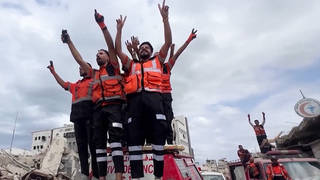
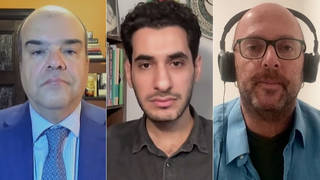
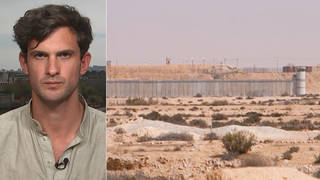
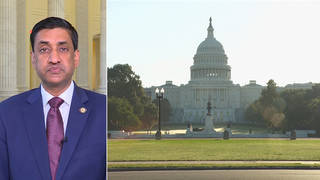





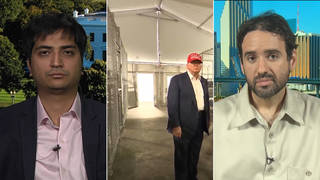

Media Options